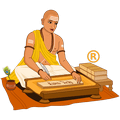











Sunrise06:04
Sunset18:30
MoonriseNo Moonrise
Moonset18:05
Shaka Samvat1918 Dhata
Vikram Samvat2053 Virodhi
Gujarati Samvat2052 Sarvajit
Amanta MonthShravana
Purnimanta MonthBhadrapada
WeekdayGuruwara
PakshaKrishna Paksha
NakshatraPurva Phalguni upto 28:42+
KaranaChatushpada upto 15:44
Rahu Kalam13:50 to 15:23
Gulikai Kalam09:11 to 10:44
Yamaganda06:04 to 07:38
Abhijit11:52 to 12:42
Dur Muhurtam10:13 to 11:03
Dur Muhurtam15:11 to 16:01
Amrit Kalam21:39 to 23:25
Varjyam11:05 to 12:50
Notes: All timings are represented in 24+ hour notation in local time of New Delhi, India with DST adjustment (if applicable).
Hours past midnight are higher than 24:00 and fall on next day. In Panchang day starts and ends with sunrise.


 Meena 07:01
Meena 07:01 Revati 07:01
Revati 07:01

 Mesha
Mesha Ashwini 06:32
Ashwini 06:32

 Mithuna
Mithuna Mrigashirsha 11:57
Mrigashirsha 11:57

 Mithuna
Mithuna Ardra 14:40
Ardra 14:40

 Karka
Karka Pushya 20:38
Pushya 20:38

 Simha
Simha Magha 26:16+
Magha 26:16+

 Simha
Simha P Phalguni 28:42+
P Phalguni 28:42+

 Tula
Tula Chitra 09:44
Chitra 09:44

 Vrishchika
Vrishchika Vishakha 10:53
Vishakha 10:53

 Vrishchika
Vrishchika Anuradha 10:42
Anuradha 10:42

 Vrishchika 10:03
Vrishchika 10:03 Jyeshtha 10:03
Jyeshtha 10:03

 Dhanu
Dhanu Mula 08:55
Mula 08:55

 Dhanu 12:55
Dhanu 12:55 P Ashadha 07:21
P Ashadha 07:21

 Kumbha
Kumbha Shatabhisha 22:43
Shatabhisha 22:43

 Kumbha 15:05
Kumbha 15:05 P Bhadrapada 20:34
P Bhadrapada 20:34

 Meena
Meena U Bhadrapada 18:42
U Bhadrapada 18:42

 Meena 17:15
Meena 17:15 Revati 17:15
Revati 17:15

 Mesha
Mesha Ashwini 16:22
Ashwini 16:22

 Vrishabha
Vrishabha Krittika 16:37
Krittika 16:37

 Vrishabha
Vrishabha Rohini 17:49
Rohini 17:49

 Vrishabha 06:41
Vrishabha 06:41 Mrigashirsha 19:41
Mrigashirsha 19:41

 Mithuna 18:12
Mithuna 18:12 Punarvasu 24:56+
Punarvasu 24:56+In Hindu Calendar, the day starts with local sunrise and ends with next day local sunrise. As sunrise time is different for all cities, Hindu Calendar made for one city is not valid for any other city. Hence it is important to use location based Hindu Calendar, like this website. Further, each Hindu day consists of five elements, which are called angas. These five elements are -
In Hindu Calendar, all five elements together are called Panchang. (In Sanskrit: Panchang = Pancha (five) + Ang (part)). Hence Hindu Calendar which shows all five elements for each day is called Panchang. In South India Panchang is known as Panchangam.
When Hindu Calendar includes Muslims, Sikh, Christian, Buddhist and Jain festivals, including national holidays, it is called as Indian Calendar.